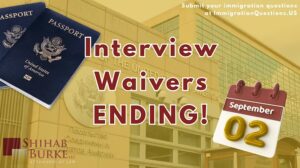Subject to certain exceptions, an H-1B visa holder may be allowed to work in the U.S. for an initial period of three years. This status may be extended for an additional three years, but it generally cannot go beyond a total of six years.

Once the six years are up, the individual cannot seek an H-1B visa extension or be re-admitted to the U.S. on H-1B unless they have resided outside the U.S. for a period of at least one year. At which time they can start the process again, by filing for the H-1B cap lottery and, if selected, seek an H-1B visa approval.
Exceptions to the Six–Year Rule
There are exceptions to this rule under sections 104(c) and 106(a) of the American Competitiveness in the Twenty-First Century Act (AC21), 8 CFR 214.2(h)(13)(iii)(D) and (E). The exceptions generally kick in if you have a green card application filed and it is pending, meaning a final decision has not yet been made.
One-Year Extension Eligibility
H-1B visas may be extended in one-year increments beyond the six-year limitation if at least 365 days have passed since one of the two events mentioned below has occurred:
- A permanent labor certificate (ETA Form 9089) is filed with the Department of Labor and the labor certification, if approved, has not been revoked, is unexpired, or has been timely filed with an EB petition (Form I-140) within the labor certification’s validity period; or
- An immigrant visa petition (Form I-140) is filed with U.S. Citizenship and Immigration Services (USCIS) and is still pending.
If one of the above two events occurs and 365 days have passed, then an H-1B extension will be granted in one-year increments until a final decision is made on the permanent resident petition. In other words, the H-1B visa will be extended yearly until:
- The immigrant visa or adjustment of status is granted.
- The labor certificate (LC) is denied.
- The I-140 is denied; or
- A decision is made on the I-140 or LC appeal. This is because a pending appeal means that the case is also pending, therefore a final decision has not yet been made on the case and the one-year extension will continue during the appeal period.
Best Time to File the One-Year H-1B Visa Extension
For the one-year extension, the petition to extend the H-1B visa may be filed prior to the occurrence of 365 days but will be approved only for a start date beyond the 365th day. However, refer to our blog to learn about recapture rules and how you can stretch out the six-year limitation of your H-1B to hopefully accrue the 365 days before your H-1B visa end date.
But if you run out of H-1B time even with recapture, you may have to change your status to a different category to remain in the U.S. Alternatively, you will need to leave the U.S. until the 365 days have accrued and then re-enter the U.S. after H-1B visa approval.
Three-Year Extension Eligibility:
In this scenario, an H-1B holder can extend their H-1B beyond the initial six-year limit in three-year increments. There are no limitations on the number of three-year increments an H-1B holder can get. The H-1B status may be extended in three-year increments beyond the initial six-year limitation if:
- The H-1B holder has an approved I-140 petition for an employment-based immigrant visa; and it is not withdrawn within 180 days of approval (refer to our separate blog on this topic); and
- The beneficiary does not have a current priority date, meaning there are no immigrant visa numbers immediately available. This is likely due to a backlog in immigrant visa processing and the beneficiary needs to wait before they can file I-485.
NOTE: An extension beyond the six–year limit will not be granted if the beneficiary has an approved I-140 petition and does not file Form I-485 (Application to Register Permanent Residence or Adjust Status) within one year of uninterrupted priority date availability.
H-1B Visa Extension Benefits
If you qualify for the H-1B extension beyond the six years, an employer can file a request for extension of your H-1B visa petition. When the extension is filed:
- The H-1B visa holder does not necessarily need to be present in the U.S. They can reside abroad when their employer files the extension of the H-1B beyond the six-year limit.
- The foreign national does not need to leave the U.S. if they are on a different valid visa status (such as H-4 or F-1) at the time the extension of the H-1B beyond the six-year limit is filed.
- Example: you are working at Company A on H-1B status. This is your 5th year working there on H-1B and you know your H-1B status will expire at the end of your 6th year. You ask your employer to file an employment-based immigrant visa petition (in other words, sponsor you for a green card), provided there is a permanent need for your job with the company. The green card petition is still being processed when your H-1B visa expires at the end of the 6th year. So even though you end up changing your status to an F-1 or H-4, an employer can still file an extension beyond the six–year limit and get you back on the H-1B visa, either in one-year increments or three-year increments depending on the specifics of your case as stated above. This will allow you to continue living and working in the U.S. while your green card is pending.
The main point to remember is that this extension can be requested only while the beneficiary is seeking permanent resident status. Think of this extension as a placeholder, allowing the beneficiary to continue legally living and working in the U.S. as they wait for the decision to be made regarding their permanent residency (green card) status.
Who Can File the H-1B Visa Extension Beyond Six Years?
Any employer in the U.S. can file this extension on your behalf. It does not necessarily need to be the employer who sponsored your initial H-1B visa or the one that filed for your green card. But you should be aware of the impact of a withdrawal of an approved I-140 petition on another petitioner’s ability to file an H-1B beyond the six years in this blog.
When Can the Extension Be Filed?
Generally, the H-1B visa extension (Form I-129) may be filed up to six months before you are eligible for the extension. It may be filed earlier than six months if there is an amendment to the petition such as a change in location, job duties, or a significant salary change.
Extensions for Spouses and/or Children
H-4 dependent spouses and children may be granted extensions beyond the six-year period for the same period as the principal spouse or parent.
Need Help?
We completely understand that this H-1B visa extension process can seem overwhelming and confusing. There may be other nuances that pertain to your case specifically not covered in this overview. Therefore, it is best to seek the guidance of the experienced immigration attorneys at Shihab Burke LLC Immigration Lawyers to address any questions you may have about this H-1B visa extension process.
Contact us today! We are here to help.









